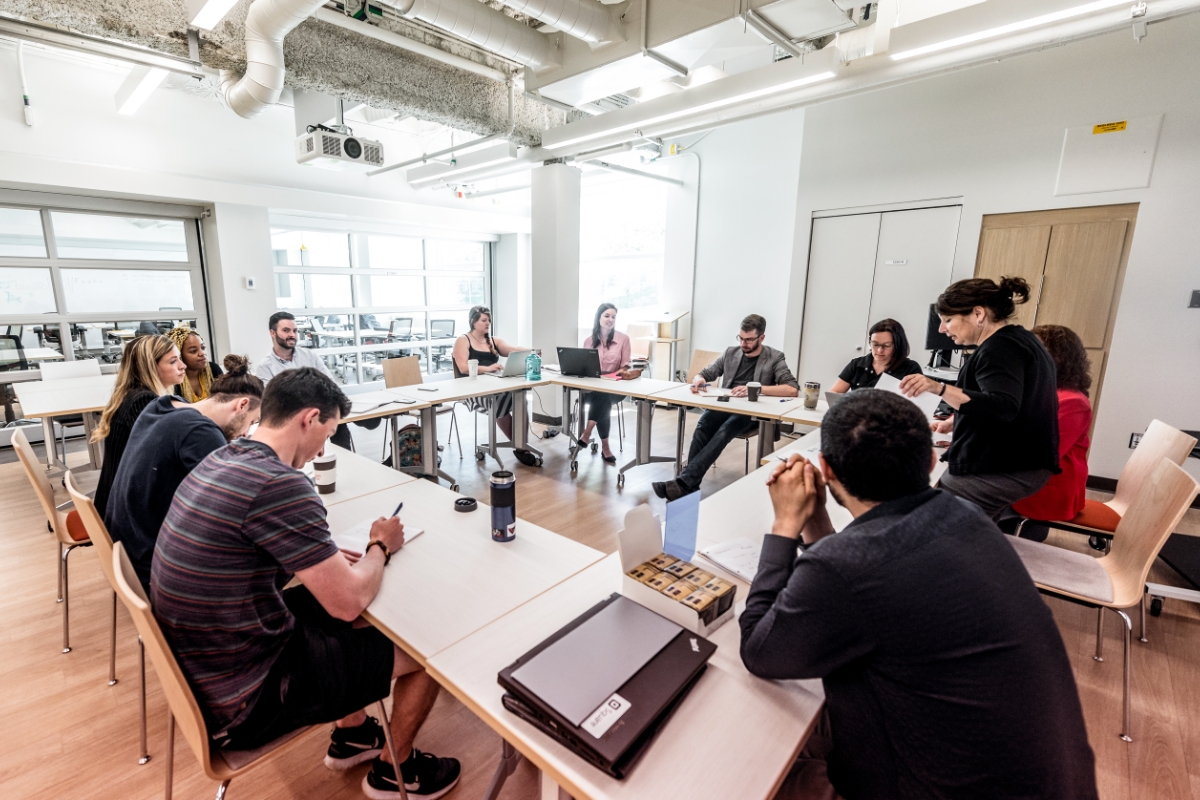
Priority 1: Inclusive research
Université Laval and its academic community commit to inclusive research and innovation that is notable for its embrace of emerging talent and its diversity of people, perspectives, disciplines and approaches.
1.1 Inclusive of diverse people and perspectives
By endorsing Canada’s Dimensions EDI Charter, Université Laval has committed to taking concrete, measurable, and sustainable EDI actions. We are applying these principles to all of our institutional activities so we can counter the systemic barriers, biases, and inequities that groups and individuals may face by taking into account the multiple effects of intersecting identities.
The University recognizes its duty to lead in this area. As such, we will soon draft an EDI policy to guide the institutional EDI action plan, which targets the University’s culture and organizational capacities while also working to increase the community’s awareness of and sensitivity to diversity among people, knowledge, and ways of thinking.
As one of the world’s leading universities, Université Laval strives for excellence in its teaching, scientific and creative practices, academic and residential environment, management, and partnerships. As part of our genuine commitment to EDI, we aim to create an environment that values all the members of the scientific community and allows them to reach their full potential.
This ambition, which must be transformational and sustainable, requires organizational openness to diverse research and innovation pathways and recognition that diverse perspectives strengthen and advance knowledge and expertise.
In its 2017–2022 Strategic Plan and the Taking Action with First Nations Peoples plan (PDF available in French only) adopted in 2020, the University set an objective to direct campus research to the needs of First Nations peoples as well as nurture strong and sustainable partnerships in order to work toward reconciliation. Through this development plan, we aim to encourage that research projects be designed in collaboration with communities and Aboriginal peoples. This should be founded on principles developed in collaboration with Aboriginal nations of the North and defined in the research guidelines of Institut nordique du Québec (INQ), which honours and draws on the knowledge, culture, and intentions of Aboriginal nations. We will also work to increase the presence of First Nations peoples and their ability to be part of our research community, particularly by creating new structuring research units.
1.2 Inclusive of the next generation of faculty and students
Université Laval is constantly striving to provide research conditions and environments that allow young scientists to conduct diverse and inclusive work that is also innovative or unique. Perseverance, openness, and collaboration are critical to the integration and success of our researchers. The University will ensure that the next generation of students and faculty has opportunities to connect to diverse research and innovation environments. In collaboration with our research units, we will offer the support they need to develop personalized career paths that allow them to achieve their full potential. The University will share the most relevant funding, partnership, and networking opportunities within and outside the university community. The University will also keep employing the best strategies to increase the appeal of our research programs and recruit the best students.
New researchers build their reputations gradually through their scientific achievements and societal contributions. Given the challenges that researchers face during the early years of their career, both here and around the world, the University will better promote their research and innovation expertise and accomplishments, both in the academic and public spheres. We will encourage researchers beginning their careers to apply for scientific awards, so they may stand as inspiring figures to other members of the university community and spark new research careers.
1.3 Inclusive of various disciplines and approaches
The main challenges society faces and the solutions to them have become increasingly complex and multidimensional. The mingling and merging of knowledge are key to encouraging innovative discoveries and transforming society. Over the years, the University has become an important leader in the sphere of interdisciplinary and intersectoral collaborations as part of major research and innovation initiatives. We will continue to support and encourage this approach, particularly through major competitions with an interdisciplinary and intersectoral approach both by designing joint projects around shared challenges and developing innovative methodologies. The University’s approach based on inclusiveness, exchanges, and cross-fertilization between research and innovation fields will also help attract scientific talent.
Université Laval stands out among Canada’s leading research universities not only for the breadth and variety of topics its research community explores but also for the diversity of its methods and approaches. This is a sign of the scientific curiosity and leadership of faculty in all disciplines, who have gradually pushed the limits of knowledge and engaged in collaboration. The University is home to a wide range of scientific approaches, ranging all the way from basic research to action research, applied research, and research-creation. We will continue to support and promote all these approaches since their very diversity is what drives the University’s impact, generating important breakthroughs and real solutions to today’s challenges.
1.4 Ethical and responsible
Université Laval is determined to remain a place that allows research and innovation to flourish freely and responsibly. Staying true to this core value is a daily challenge as the use of technology raises unprecedented ethical concerns and opportunities to collaborate with a growing number of dynamic and diverse stakeholders. More than ever, this complex situation requires the University and every community member to remain vigilant about our social responsibility. Through this development plan, the University is restating its commitment to upholding the highest standards of ethics and integrity in all aspects of its research and innovation.
To do so, we will continue to educate the members of our research community about issues and standards surrounding responsible behaviour so everyone can achieve their potential in an open and honest research and training environment. Through our efforts to support and educate our community, we will continue to set the standard as one of the most proactive institutions in the world in this area.
Our Community in Action
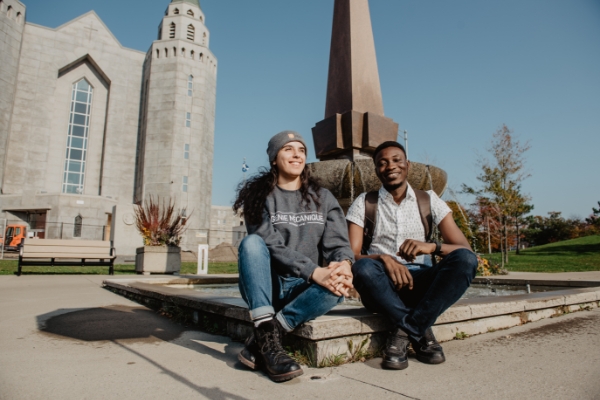
Sharing EDI expertise and knowledge
As a leader in EDI knowledge development, Université Laval founded Institut EDI2 Équité, diversité, inclusion et intersectionnalité (Institute for Equity, Diversity, Inclusion, and Intersectionality) in 2020. The Institute is a centre of expertise on intersectionality that develops partnerships with local, national, and international organizations to share and transfer knowledge and expertise as widely as possible, through interdisciplinary training and other activities.
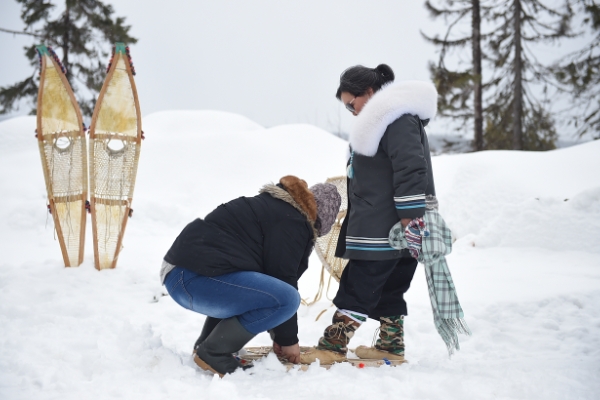
Developing best practices together
Institut nordique du Québec (INQ) created the First Peoples Committee out of a genuine desire to include the interests and aspirations of the Indigenous communities of northern Québec in our research. As a result, the 4 Aboriginal nations of northern Québec are integral to INQ’s governance. A range of tools has since been developed and shared with the research community to ensure that any projects conducted in the North are co-constructed with Indigenous communities.
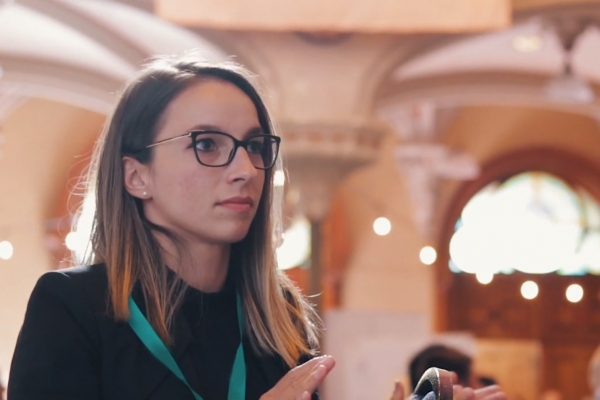
Cultivating innovative ideas
OBVIA’s innovative ideas incubator was founded to help students develop innovative ideas to maximize the positive societal impact of artificial intelligence and digital technology. Students in an interdisciplinary cohort learn to collaborate with a range of stakeholders, including the local community, to solve societal challenges and contribute to the common good.

A unique, transformative, and innovative network
Through its Sentinel North strategy, Université Laval develops new technologies, trains a new generation of interdisciplinary researchers, and fosters transformative research and the convergence of expertise. This synergy is gradually shedding light on the complex interactions between human health and the environment in the North to solve complex local and global problems.

Helping renovate Québec schools
The Schola project brings together disciplines such as architecture, education, and product design and works with partners and researchers from various backgrounds to give decisionmakers the tools they need to renovate a school. Through project research, field experience, data collection, and a participatory approach, the Schola project’s team and collaborators help project managers create schools that foster educational success and student well-being.
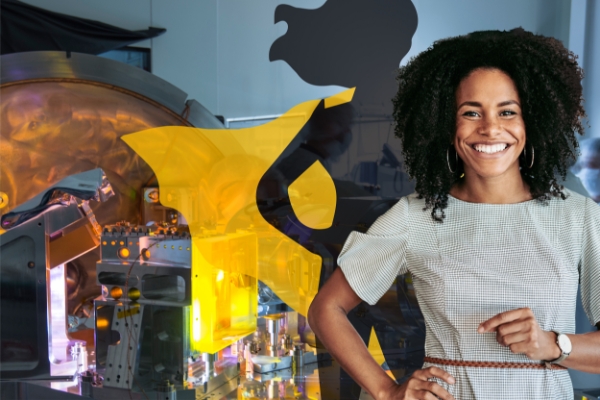
The Responsible Conduct of Research Week
RCR Week, which provides the university community with a valuable opportunity to reflect on and raise awareness of responsible research, is a key event showcasing the University’s commitment in this area. Each year, community members are invited to pause and examine the things they take for granted to identify best practices for maintaining the public’s trust in research.
